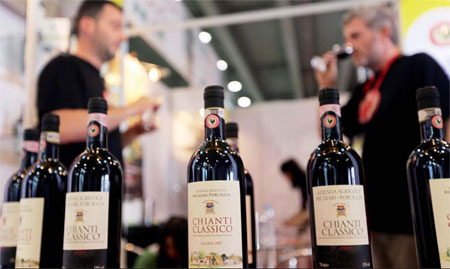Vines shake in bitter trade wind
Updated: 2013-06-21 08:56
By Li Xiang (China Daily)
|
|||||||||||
|
Imported wines from Europe at a recent food expo in Guangzhou. China has decided to investigate wine imports from the EU. Liu Jiao / for China Daily |
Chinese inquiry into European wine imports leaves producers in a pickle
China's decision to investigate wine imports from the European Union has sparked anxiety in the wine industry amid an escalating trade dispute over Chinese solar panel exports.
The main wine exporters to China - France, Spain, Italy and Germany - are likely to be hurt the most if strict measures in the form of taxes or limits are implemented by the Chinese on wine imports from the EU, industry experts say.
"We are already seeing a delay in orders as our Chinese importers are waiting for the final decision," says Jean-Pierre Rousseau, managing director of Diva Bordeaux, a French wine exporter.
Rousseau says China has become a crucial market for French wine, and any tough measures imposed will hit the industry hard.
France is Europe's biggest wine exporter to China, its third-largest market worth an estimated 800 million euros, and accounts for nearly 30 percent of Bordeaux's total exports.
Spain is ranked second, worth 89 million euros, followed by Italy at 77 million euros, according to EU figures.
Beijing's move came immediately after the European Commission's decision to impose punitive tariffs on Chinese solar panel products.
The Chinese Ministry of Commerce has said the wine investigation was not a retaliatory measure.
While French President Francois Hollande has called for a special meeting of EU member states to form a cohesive and united position in trade negotiations with China, his trade minister, Nicole Bricq, had said that tension had arisen in China-EU trade but a trade war did not exist. She added that negotiation was in the mutual interests of both sides.
Italian Prime Minister Enrico Letta says he will follow China's investigation into European wine "with maximum attention" given the importance of the sector to the country's economy.
Louis Fabrice Latour, chairman of the French Federation of Wine and Spirits Exporters, says the French wine industry was "caught by surprise" and felt "kidnapped" in a wider trade dispute between China and EU.
"If the investigation is launched against imports of EU wines to China, it will raise a legitimate concern among French wine producers and exporters, as China is an important market and concerns 500,000 jobs.
"We hope the EU and China will resolve these trade tensions through dialogue and negotiation, and we are certain that France will encourage them."
France is one of only four EU nations that voted in favor of the anti-dumping taxes of 11.8 percent on Chinese solar panel imports, which will be in effect from now until August, after which they will be extended to 47.6 percent for another four months.
Italy, Portugal and Lithuania are the others that voted for the taxes.
The wine dispute cast a shadow over Vinexpo, an international wine fair held in Bordeaux from June 16 to 20.
However, some experts say higher taxes will have little impact on Chinese consumers' thirst for foreign wines as demand remains strong, and foreign wines are already taxed about 50 percent.
Seventeen Chinese enterprises participated in the exhibition, an increase reflecting the growing popularity of wine in China.
The real problem for European wines in China, they say, is counterfeit products, but they agree that a compromise and agreement between China and the EU is necessary to resolve the current trade dispute.
"In the solar panel case and the wine case, we are at the first steps of investigation on both sides," says Jean-Paul Larcon, a professor at French business school HEC Paris. "A mutually acceptable compromise will be negotiated rapidly because a trade war would be too damaging to both sides."
Larcon says the French position in favor of the penalty on Chinese solar exports could be explained by the country's internal debate on energy policy and the need to diversify energy sources.
"French companies have a strong competitive advantage in the nuclear energy sector, but they are quite weak in the solar energy sector," he says. "So the French position aims to protect French companies in this area."
Francoise Nicolas, director of the Center for Asia Studies at the French Institute of International Relations, says one aim of the solar panel tariffs is to engage China in dialogue and give Beijing reason to come to the negotiating table.
"Unlike Germany, I suppose France thinks that there is a need to put stronger pressure to get Beijing to accept discussion, and that simple requests are no longer enough," she says.
Some analysts are concerned the trade dispute may put Sino-French relations at risk, even though Hollande visited China less than two months ago hoping to strengthen ties with the country's new leadership.
"It is not a minor dispute but it should not affect the well-established, long-term cooperation between China and France in the political, economic and cultural domain, however," Larcon says, noting that French companies have developed a successful presence in China over many years, and France is one of the three largest destinations for Chinese direct investment in Europe.
"China and France will find a positive solution to the current dispute because of the potential of mutually beneficial collaboration and the interests of French companies."
lixiang@chinadaily.com.cn
(China Daily European Weekly 06/21/2013 page8)
Today's Top News
List of approved GM food clarified
ID checks for express deliveries in Guangdong
Govt to expand elderly care
University asks freshmen to sign suicide disclaimer
Tibet gears up for new climbing season
Media asked to promote Sino-Indian ties
Shots fired at Washington Navy Yard
Minimum growth rate set at 7%
Hot Topics
Lunar probe , China growth forecasts, Emission rules get tougher, China seen through 'colored lens', International board,
Editor's Picks

|

|

|

|

|

|






